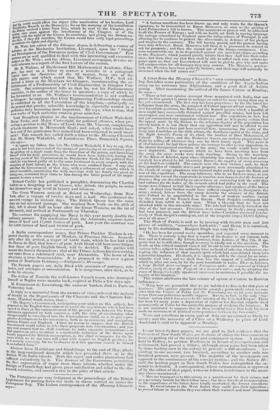A letter from the Morning Chronicles " own correspondent" at
Bom- bay furnishes some particulars of the condition Of the Anglo-Indian A letter from the Morning Chronicles " own correspondent" at Bom- bay furnishes some particulars of the condition Of the Anglo-Indian
army on its entrance into Afghanistan, and a good deal of Asiatic gossip. After mentioning the arrival of Sir James Comae at Bombay, he says-- " There is but one opinion amongst those acquainted with India, that our power in this quarter is about to undergo an ordeal ihr more trying than any it Ims yet encountered. The first step has been propitious : by the the latest in-
telligence from the army, the conquest of Cahoot app..ars all but certain. The two formidable positions, the Bohol and the Kojnek passes, which a handful of
men might have stienes,lay defended against powerful armies, had been left unoccupied, and were surmounted without loss. The expedition, in fact, has not yet encountered ally opposition whatever ; and as it is pretty certain that the appeal simile by the Sinhas to the religious bigotry of the population has
utterly failed, it is nut likely that any opposition now he offered to our
progress. Letters have just been received here, announcing the entry of the army into Candahar on the 25th ultimo, the Southern capital of the state, and the (light towards Persia of its cldef, the brother of Dost. Mohammed, of Cabool. The latter, and the Peshawar Anwer, arc making preparations for flight by selling oil' whatever they can lay their hands upon. This news is
of vital interest ; for had these princes the courage to offer us any opposition, in the almost disorganized condition of the army, the result would have been
most deplorable. The accounts which we have been receiving here from the army fbr some weeks were truly startling. Owing to the treachery of the Khan of Kheilat, upon whose friendship too much reliance hod unfor-
tunately been placed by Sir Alexander Burnes, the sopplies evert/ necessary
of laud been withheld. The camels were the first victims ; and, by their loss, quantities of valuable stores and property were necessarily abandoned to
the clouds of savage plunderers who hovered night and day upon the flank and rear of the expedition. The camp followers, who in an Eastern army, as you are aware, far exceed the combatants in number, soon began ta.Pel the horrors of famine; they are described by an eye-witness as contending with the wild days and vultures for the bodies of the animals which had pito; in the road. The troops were reduced to half their regular allowance, and numbers of the horses shot. A short time further would have sufficed completely to disorganize the army ; indeed, letters from the camp describe the advance of the British into CAA to be unparalleled' in the annals of modern warfare, except by the retreat of the French from Russia. Shah Soojah's contingent had dwindled from 6,000 to 1,500 men. What a blessing that we were not attacked while in this miserable state I The title had fortunately turned at the date of the last. accounts. Provisions were coining in freely ; many camels had been procured, and the British force before Candahar mustered (exelu- sively of Shah Soojah's contingent, and of the irregular corps) 11,000 lighting noes) of all arms."
The Shah of Persia is said to be moving with 60,000 men and 200 pieces of artillery, "somewhere forthwith ;" and Herat, it is surmised, may lie his destination. Runjeet Singh was very ill- " lie has been for several weeks speechless, and expected every moment to die. There is scarcely it day that a report of his demise is not current, both here and at Calcutta. By letters, however, from Lahore, of May ?thy it ap- pears that he is still alive, though recovery is wholly out of the question. His deado at this critical motnent cannot fail to add to our embarrassments. The various tribes subject to his authority have no bond of colic:don whatsoever, ex- cepting the influence of that master-spirit which had consolidated them into a powerful kingdom. Ills death, it is supposed, will be the signal for au inter- minable civil war ; and we shall thus lose the support of a military power which is, after our own, by for the must timmitiable in India. There is, !tweeter, a large British eneumped art F,ragnmr, under the rinnoottal ‘,1* Colonel Hunter, ready to enter the. Puq,ub at a nontienrs 7101;CC, and, by adopting the cause of inject's legally appointed successor, to maintain, if possible, the in- tegrity of his kingdom." The writer attributes the late seizure of opium at Canton to Russian influence- " Many here are persuaded that we are indebted to Itios,la for this piece of kindness. The opinion appears probable enough ; particularly when we con- sider that the Courts of Yehin nod St. Petersburg are Oil fin• more intimate terms than our politicians usually suppose. Russia, in flog, is the only bar- barian ' nation which has access to the hotel-ior of the Celc,dial Empire. There has been for many years it deputation of eight or ten Russian subjects fixed permanently at Pekin for the (ostensible purpose of st tulylog the language. It is not unuatural to suppose, that in these eventful times that body has been made an instrument of political C OITCVOI idence between the two courts." Wars and rebellions in every part of Asia are mentioned as likely to occur; and the necessity of a Clive or a W.ellesley in place of Lord Auckland is said to be apparent at Bombay.


























 Previous page
Previous page